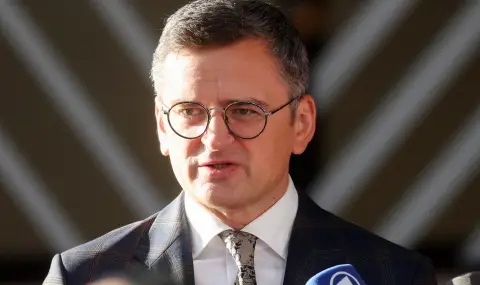The BBC offers its own reading of the situation why Dmytro Kuleba, who made history by heading the Ukrainian Foreign Ministry during the war declared by Russia, was removed, quoted by news.bg .
Last but not least, with his efforts, an international coalition was formed in support of Ukraine, thanks to which Kiev continues to resist the aggressor.
This week he was unexpectedly replaced by another heavyweight diplomat - Andrii Sibiga. The BBC points out what caused this rotation and how it will affect Ukraine's international standing.
The resignation of Ukrainian Foreign Minister Dmytro Kuleba is the loudest part of the "restart" of the Ukrainian government, which was carried out this week. For many observers, this is completely unexpected and absolutely illogical.
Dmytro Kuleba is perhaps the most famous minister from the government of Denis Shmygal, who did not leave a very bright mark in the history of Ukraine. Kuleba was the oldest in this government - he headed the Ministry of Foreign Affairs in "a past life" - back in March 2020, when he had to demonstrate his diplomatic abilities during the coronavirus pandemic, and then he had to reformat the entire Ukrainian diplomacy, given the war unleashed by Russia.
The creation of the international coalition in support of Kyiv, the introduction of large-scale sanctions against Russia, the start of negotiations on Kyiv's membership in the EU, the re-opening of Ukraine to the global south - all these are only a small part of the challenges that Kuleba had to deal with to cope, and he did it quite successfully: not every Ukrainian minister is sent into retirement with thanks for their joint work from the head of the US State Department, the German foreign minister and the head of diplomacy in the European Union.
The scale and complexity of the tasks that stood before Kuleba often forced him in the last two years to act with atypical, sometimes unacceptable methods in diplomacy.
In an interview with the Washington Post, he said that the art of diplomacy is to break down the wall in front of you brick by brick, but sometimes you have to smash it with your head.
Kuleba's image as a sophisticated intellectual and PR specialist often worked in his favor - the Economist described him as "the mad diplomat", as "a skilled negotiator with round glasses, looking more like Harry Potter than John Lennon." ;.
At the same time, for ordinary Ukrainians, he is "one of the people", who congratulates his compatriots on Independence Day with slices of bacon that his aunt from Poltava region gave him, or sincerely admits that time at work with Anthony Blinken have allowed themselves a "snack" in a fast food restaurant. They say that in his student years, when he had a hangover, Kuleba ate at "McDonald's". Thus, for quite a long time, Kuleba enjoyed a high rating, something atypical for Ukrainian civil servants.
For this reason, the request for his resignation came as a surprise to many in the Rada, who wished to know more details and were not ready to vote for it without being clear about what was actually going on. /p>
This was the reason for postponing the vote on Kuleba's resignation from Wednesday to Thursday - however, Zelensky's reasons were quite abstract and generally repeated long-known things - some ministers no longer had energy, and the government needed new energy for work.
Political scientist Vladimir Fesenko said that as early as last fall, he heard talk of the possible replacement of Dmytro Kuleba.
About the same time, there were rumors on the fringes of Kiev that Kuleba himself was not averse to leaving his post due to sheer fatigue.
Analyzing the factors that could lead to Kuleba's resignation, it is worth recalling Zelensky's psycho-profile. It is no secret to anyone that he is an emotional person and for him fruitful cooperation is very important, even if it sounds irrational.
It seems that at one point Kuleba was not on the "waves" of Zelensky. It is difficult to say exactly when this happened.
BBS sources do not rule out that this happened because of the skepticism with which the minister allegedly treated the flagship project of the head of state - the summit for peace.
A former Ukrainian diplomat claimed to the BBC that Dmytro Kuleba's resignation could also be due to purely institutional reasons. The fact is that the Ukrainian constitution itself establishes a certain dual power in the foreign policy sphere: foreign policy must be led by the president (and, accordingly, by his administration), but it must also be implemented by the Ministry of Foreign Affairs.
